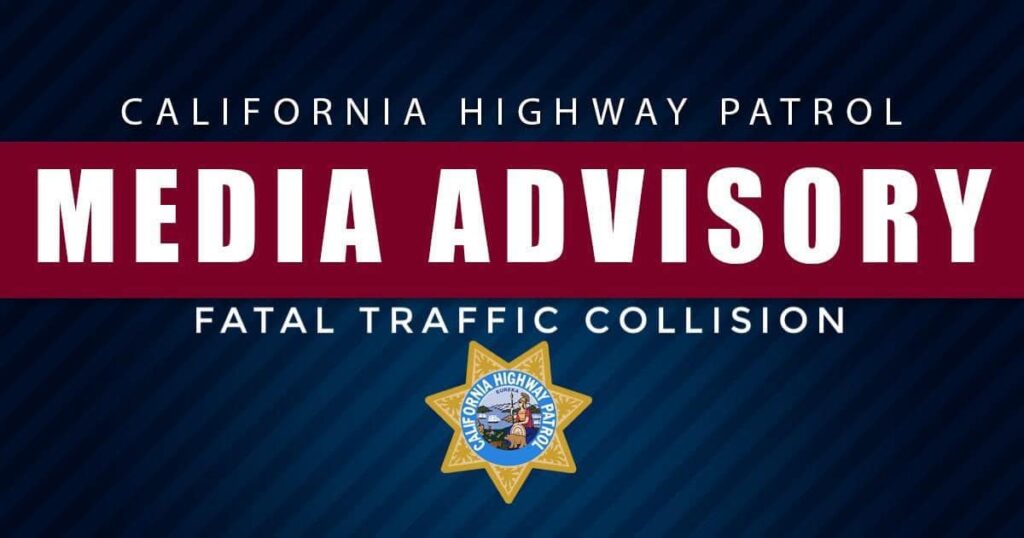Holiday Enforcement Period Friday, May 23 at 6:01 PM to Monday, May 26 at 11:59 PM
SACRAMENTO — As Memorial Day weekend marks the unofficial beginning of summer, the California Highway Patrol (CHP) urges drivers and passengers to prioritize safety by buckling up before each trip.
The CHP will begin its annual statewide Memorial Day Holiday Enforcement Period (HEP) on Friday, May 23, at 6:01 p.m. and continue through Monday, May 26, at 11:59 p.m. To help maintain safety on California’s roadways, CHP officers will be vigilant for impaired and reckless drivers and motorists who fail to buckle up.
“Our top priority is keeping the public safe, not just during the holidays but daily,” said CHP Commissioner Sean Duryee. “Buckling up is one of the easiest and most effective ways to protect yourself and your passengers in a crash. Our officers will be out in force to help everyone arrive at their destination safely.”
In addition to CHP officers driving traditional black-and-white patrol vehicles, motorists are reminded that they may encounter the CHP’s new generation of low-profile Specially Marked Patrol Vehicles on the roadway. These fully marked patrol vehicles blend into traffic just enough to observe the most reckless and dangerous driving behaviors without immediate detection.
Last year, 42 people lost their lives in crashes across California during Memorial Day weekend. Tragically, nearly half of all vehicle occupants killed in a crash within CHP jurisdiction were not wearing seatbelts. CHP officers also made more than 1,100 arrests for driving under the influence of alcohol or drugs.
California law mandates that all drivers and passengers aged eight and older must wear seatbelts. Children under eight need to be properly secured in an appropriate child passenger safety seat or booster seat situated in the back seat of the vehicle. Children under two must also ride in a rear-facing car seat unless they weigh more than 40 pounds or are taller than 40 inches.
This year, the CHP’s holiday enforcement effort coincides with the National Highway Traffic Safety Administration’s (NHTSA) designation of May 19 – June 1 as the national “Click it or Ticket” mobilization campaign. Throughout this awareness initiative, CHP personnel will concentrate their enforcement efforts on seat belt and child safety seat violations.
As always, the CHP urges everyone to make smart choices behind the wheel: Buckle up. Drive sober. Stay alert. If you plan to drink or use drugs, arrange for a safe ride home before heading out. Your safety and the safety of others depend on it.
Let’s work together to make this Memorial Day weekend safe for all Californians.
The mission of the CHP is to provide the highest level of Safety, Service, and Security.
Read More
Nissan’s burning battery causes hazmat incident
By Officer Daniel Gilmore, PIO, CHP-Contra Costa
On Thursday, May 21, 2025, at approximately 10:18 p.m., officers assigned to the California Highway Patrol’s (CHP) Contra Costa Area office responded to a two-vehicle head-on crash which occurred on State Route 4 (SR-4) eastbound, just west of Fairview Avenue, in Brentwood.
An Acura RL was traveling westbound on SR-4 in a reckless manner and crossed over double yellow lines into the eastbound lane. The Acura crashed head-on with a Nissan Ariya, which was travelling eastbound. Following the impact, the Nissan became fully engulfed in flames. Tragically, both drivers, and sole occupants of their respective vehicles, sustained fatal injuries because of the crash and were pronounced deceased on scene.
Due to the hazardous chemical composition of the Nissan’s battery, the scene was declared a hazmat incident. Consequently, emergency services were unable to immediately extract the driver of the Nissan until the scene was made safe.
Both eastbound and westbound lanes of SR-4 were closed at approximately 10:28 p.m., for on-scene investigation, and were re-opened at approximately 5:32 a.m. the next morning.
This crash remains under investigation.
The Mission of the California Highway Patrol is to provide the highest level of Safety, Service, and Security.
Read More
Suspect Michael James Woodruff’s arrest and the gun, drugs and paraphernalia confiscated from him. Photos: Brentwood PD
By Brentwood Police Department
Last Wednesday around 11:00 AM, a Brentwood officer was patrolling the area of Brentwood Blvd. and Sims Road when he noticed a vehicle with expired registration.
While speaking with the driver, identified as 42-year-old Michael James Woodruff (born 3/4/1983), a second officer on scene observed a firearm in Woodruff’s waistband.
Officers safely detained Woodruff and conducted a search of the vehicle, where they located drugs, a digital scale, small baggies, and ammunition.
Woodruff was arrested for multiple firearm and drug-related offenses and transported to the Martinez Detention Facility for booking.
This arrest is another example of how proactive policing helps keep illegal weapons and narcotics off our streets.
According to the Contra Costa Sheriff’s Department, the five-foot, 10-inch tall, 220-pound Woodruff is Hispanic and being held in the West County Detention Facility on $354,000 bail. His next court appearance is on May 29th at 8:30 AM in Department 4 at the courthouse in Pittsburg.
Allen D. Payton contributed to this report.
Read MoreBy CHP-Contra Costa
CONCORD, CA – On Tuesday May 20th, 2025, at approximately, 5:24 p.m., officers assigned to the California Highway Patrol’s (CHP) Contra Costa Area office responded to a two-vehicle crash which occurred at the northernmost intersection of northbound Kirker Pass Road and Hess Road in Concord.
A Ford Fusion stopped at the westbound Hess Road intersection attempted to make a left turn onto southbound Kirker Pass Road. While turning, it pulled into the path of a Toyota Sienna traveling northbound on Kirker Pass Road, resulting in the Toyota crashing into the Ford’s driver side.
The Ford was occupied by an adult female driver and a 14-year-old male passenger in the front right seat. The Toyota was solely occupied by an adult female driver. Tragically, the driver of the Ford sustained fatal injuries and was pronounced deceased at the scene. The 14-year-old sustained suspected major injuries and was airlifted to the hospital. The driver of the Toyota sustained minor injuries and was transported to the hospital by ambulance. Both the 14-year-old and Toyota driver are expected to recover from their injuries.
An impaired driving investigation was also conducted, and DUI was ruled out as a factor in this crash.
Both northbound and southbound lanes of Kirker Pass Road were closed at approximately 5:35 p.m., for on-scene investigation, and were re-opened at approximately 8:40 p.m.
This crash remains under investigation.
The Mission of the California Highway Patrol is to provide the highest level of Safety, Service, and Security.
Read MoreSACRAMENTO – The California Highway Patrol (CHP) graduated six newly trained K-9 teams today, Thursday, May 22, 2025, at its West Sacramento K-9 training facility, marking a significant step in bolstering public safety across the state.
After months of intensive training, five Belgian Malinois and one German Shepherd join their human partners on a mission to detect narcotics, explosives, and criminal suspects. This graduating class is the first to include canines trained to detect the scent of fentanyl from the beginning of their instruction—a proactive move to combat California’s opioid and fentanyl crisis.
“These new K-9 teams have demonstrated incredible dedication and skill throughout their training,” said CHP Commissioner Sean Duryee. “They’re not just protecting our communities—they’re enhancing our department’s ability to fight crime and save lives.
The new teams represent various regions across the state, with officers from the CHP’s Coastal, Golden Gate, Valley, Border, and Inland field divisions. These handlers bring between six and 17 years of departmental experience, ensuring seasoned leadership behind each K-9.

A CHP K-9 Team is congratulated during the graduation ceremony on Thursday, May 22, 2025. Video screenshot source: CHP
The class includes:
- Three Patrol and Narcotics Detection Canine (PNDC) teams
- One Patrol and Explosives Detection Canine (PEDC) team
- Two Narcotics Detection Canine (NDC) teams
The PNDC teams completed at least 440 hours of criminal apprehension and narcotics detection training, while the PEDC team completed 600 hours focused on criminal apprehension and explosives detection. The NDC teams completed a minimum of 240 hours of training. All teams adhered to the California Commission on Peace Officer Standards and Training (POST) guidelines and will continue to train at least eight hours each week to maintain peak readiness.
The CHP’s K-9 program now includes 50 active teams statewide:
- 34 PNDC teams
- Nine PEDC teams
- Five Explosives Detection K-9 teams
- Two Narcotics Detection K-9 teams
In 2024 alone, CHP K-9s helped seize nearly 823 pounds of fentanyl, showcasing their critical role in the fight against illegal drugs.
The CHP invites dedicated law enforcement professionals to explore a career as a
K-9 handler. Learn more and apply at www.CHPMadeForMore.com to become part of an elite team serving and protecting California—four paws at a time.
The mission of the CHP is to provide the highest level of Safety, Service, and Security.
Read More

A drive-up ATM at the Bank of America branch on Lone Tree Way in Brentwood was stolen on Thursday morning, May 22, 2025. Photo: Brentwood PD
San Jose suspect has history of arrests for theft, violent crimes since 2011
Contra Costa Sheriff, Antioch Police help establish perimeter
By Brentwood Police Department
Early this morning, Thursday May 22, 2025, Brentwood officers were dispatched to the 5100 block of Heidorn Ranch Road for a report of a suspicious circumstance along the Highway 4 corridor involving individuals associated with a Jeep.
As officers arrived, the suspects fled in the Jeep. Shortly thereafter, it was discovered that a large ATM safe had been forcibly removed and stolen from the Bank of America located on the 6200 block of Lone Tree Way. Evidence indicated the ATM’s cash box had been dragged along the Highway 4 corridor, where officers first responded.
A short time later, Brentwood Dispatch received a call reporting a vehicle matching the suspect description in the Deer Ridge area.
With the assistance of the Contra Costa County Sheriff’s Office and the Antioch Police Department, a perimeter was quickly established.
During a search of the area, 34-year-old Kevin Monge of San Jose (born 12/21/1989) was located hiding in a bush and was safely taken into custody.
Monge was arrested for grand theft and other related charges and transported to the Martinez Detention Facility.
According to the Contra Costa Sheriff’s Department, the five-foot, seven-inch tall, 190-pound Monge is being held on 30,000 bail.
According to localcrimenews.com, he is Hispanic and has a history of arrests dating back to 2011 by multiple agencies, including Santa Clara County Sheriff’s Department, Santa Clara PD, San Jose PD, Dublin PD and Orange PD for crimes including forgery and petty theft on Feb. 26, 2025, battery on a spouse, cohabitant or former spouse, grand theft, receiving or concealing stolen property, possession of another person’s ID with intent to defraud, possession of burglar’s tools, assault with a deadly weapon likely to produce great bodily harm and twice for DUI.
Allen D. Payton contributed to this report.
Read More
Mural designed, created, and installed by LMC art students to celebrate the 51st Commencement. Source: LMC
Honors 1,358 Class of 2025 graduates on Friday
By Juliet V. Casey, Director of Marketing, Los Medanos College
Pittsburg, CA – Los Medanos College is pleased to announce its 51st Commencement celebration to held at 2:15 p.m. on Friday, May 23 inside the LMC Stadium.
The ceremony honors 1,358 graduates who earned 2,266 awards, including 662 associate of arts degrees, 176 associates of science degrees, 228 associates of arts degrees for transfer, 302 associates of science degrees for transfer and 698 certificates of achievement.
The stadium is located at 2700 E. Leland Road in Pittsburg. Students should plan to arrive no later than 1:15 p.m. for check-in and line-up on the Softball Field.
“We are exceedingly proud of the Class of 2025,” LMC President Pamela Ralston said. “This group represents resilience and courage as well as an abiding hope for a brilliant future.”
As part of her address to graduates, Ralston will highlight graduating students for their achievements in the classroom, in their campus life and in the community. She will acknowledge the special status of several of the graduates who persevered as the first in their families to attend and graduate college. Others, she recognizes for their determination to expand their horizons even as they care for children or others. She also recognizes students who continued to work to support their families while attending college, veterans, and those who took courageous steps to start new traditions and events, contributing to the cultural wealth of LMC’s college community.

Featured graduation speakers Naw Shanyda Soe, Associate of Arts: Biological Science, Graduating with Honors and Mikayla Ari Hubbard, Associate in Science for Transfer: Business Marketing, Graduating with Honors. Source: LMC
Other featured speakers include honors graduates Naw Shanyda Soe, Associate of Arts in Liberal Arts: Math and Science, Associate in Science for Transfer in Biology, and a Certificate of Achievement in Intersegmental General Education, and Mikayla Ari Hubbard, Associate in Arts for Transfer in Business Administration and a Certificate of Achievement in CSU General Education. Los Medanos College Associated Students President Armon Gozalez and District Student Trustee Halena Neyazi will help lead the turning of tassels.
Ceremony Details
The 2025 ceremony will be held on May 23, 2025, at 2:15 PM inside the LMC Stadium on the Pittsburg campus. Students should plan to arrive no later than 1:15 PM for check-in and line-up on the Softball Field.
The ceremony is general admission and no tickets are required to attend. There is NO RESERVED SEATING at the stadium. The stadium bleachers have wheelchair access with limited seating for people with disabilities. Chairs will also be placed on the walkway at ground level of the field for additional seating and accessibility. Guests should arrive early for optimal seating.
LMC Stadium Policy: Prohibited Items
Los Medanos College is committed to providing a safe, comfortable and enjoyable experience. Thank you for your cooperation with the following:
The following are not permitted anywhere on-campus:
- Alcoholic beverages and smoking
- Dogs/animals (except for service animals)
- Weapons or explosives of any kind
The following are not permitted inside the Stadium:
Guests who attempt to bring the following inside the stadium will be asked to take them outside and/or return them to their vehicles.
- Artificial noise-making devices
- Glass bottles
- Balloons
- Signs/displays larger than 11”x17”. (All signs must be hand carried and may not be mounted on posts/poles/etc.)
- Umbrellas larger than 42” are not permitted in the bleachers. (Larger umbrellas may be used in other areas of the stadium.)
For more ceremony details for the Class of 2025, please visit the LMC Commencement website. Additional details regarding the event will be available soon. Keep checking that page for more information.
About Los Medanos College (LMC): LMC is one of three colleges in the Contra Costa Community College District, serving the East Contra Costa County community. Established in 1974, LMC has earned federal designations as a Minority-Serving and Hispanic-Serving institution. It offers award-winning transfer and career-technical programs, support services, and diverse academic opportunities in an inclusive learning environment. With exceptional educators, innovative curriculum, growing degree and certificate offerings, and state-of-the-art facilities, the college prepares students to succeed in their educational pursuits, in the workforce, and beyond. LMC’s Pittsburg Campus is located on 120 acres bordering Antioch, with an additional education center in Brentwood.
Read More$8.3 million in grants; $2.6 million in district matching funds
By Dave Mason, Public Information Supervisor, Public Affairs, East Bay Regional Park District
The East Bay Regional Park District is set to spend $10.9 million over the next three years to reduce fire fuels at Anthony Chabot, Tilden, and Wildcat Canyon Regional Parks, Claremont Canyon Regional Preserve, and Carquinez Strait Regional Shoreline. The funding will help reduce wildfire risks by removing dead and dying trees and hazardous vegetation on over 600 acres. Dead trees burn hotter and faster and can cast embers long distances, igniting new fires.
These efforts are in addition to ongoing fuels reduction work districtwide, including large-scale projects at Anthony Chabot Regional Park (544 acres) and Tilden Regional Park (39 acres), a 16-person year-round fuels reduction crew, and annual goat, sheep, and cattle grazing. In 2024, the Park District’s fuels reduction crew removed hazardous fire fuels on 104 acres in 11 parks. Additionally, more than 86,800 acres of parkland are grazed annually by cattle, sheep, or goats.
“The grant funding enhances our ability to protect the public and safeguard our natural landscapes,” said Park District Interim Fire Chief Khari Helae. “Securing the funding is a testament to the Park District’s efforts—from planning to permitting—to manage the detailed grant application process and its proven ability to carry out large-scale fuels reduction projects in support of the community.”
The $10.9 million for fuels reduction projects includes $8.3 million in grants, with $6.1 million coming from the Federal Emergency Management Agency (FEMA), $2.1 million from the California State Coastal Conservancy, and $100,000 from the U.S. Forest Service. FEMA funding was obtained in partnership with U.S. Sen. Alex Padilla, who secured $1.5 million in the 2023 budget, and U.S. Rep. Eric Swalwell, who secured $1.4 million in the 2024 budget.
An additional $2.6 million comes from required Park District matching funds, which include general funds and voter-approved local revenue measures like Measure FF. These local revenue measures enhance the Park District’s ability to qualify for and secure grant funding by providing required matching contributions.
“These projects are vital to reducing wildfire risks in the East Bay,” said Park District General Manager Sabrina Landreth. “We thank FEMA, Sen. Alex Padilla, Rep. Eric Swalwell, the California State Coastal Conservancy, the U.S. Forest Service, and Park District voters for their support and for prioritizing wildfire mitigation in the East Bay.”
For large scale vegetation management projects, the Park District utilizes a climate-friendly carbonizer to dispose of vegetation. The carbonizer burns organic matter at 1,300 degrees Fahrenheit with little oxygen, which produces very low emissions—especially compared to conventional disposal methods such as open pile burning or transporting debris long distances in diesel trucks. The resulting biochar is being used throughout the Park District to enhance soil health, improve water retention, and increase crop productivity, including at the District’s Ardenwood Historic Farm in Fremont.
The Park District Board of Directors will consider authorizing $1,883,261 in matching funds from Measure FF at their upcoming Board Meeting on Tuesday, May 20, 2025. Measure FF was passed in 2018 by voters in the communities of Alameda, Albany, Berkeley, El Cerrito, El Sobrante, Emeryville, Kensington, Oakland, Piedmont, Richmond, and San Pablo to provide funding to reduce fire risks, improve public access, and restore natural habitat. The Board of Directors previously authorized $500,016 in matching funds in March 2023.
The East Bay Regional Park District is the largest regional park system in the nation, comprising 73 parks, 55 miles of shoreline, and over 1,330 miles of trails for hiking, biking, horseback riding, and environmental education. The Park District receives an estimated 30 million visits annually throughout Alameda and Contra Costa counties in the San Francisco Bay Area.
Read More
2025 Greater Bay Area District Attorney Summit attendees. Source: Diana Becton for District Attorney
Elected District Attorneys and senior prosecutors from across the Bay, Northern California
By Bobbi Mauler, Executive Assistant, Contra Costa District Attorney
Area and beyond gathered in Contra Costa County for the 2025 Greater Bay Area DA Summit. The all-day, invitational summit brought together leaders to collaborate on legal strategies and share innovations that address some of the most urgent challenges facing the criminal justice system. Now in its third year, the summit has become a critical regional forum since its inception in Santa Clara County in 2022 and continuing in Napa County in 2023. The 2025 summit took place on May 16th at the Veterans Memorial Center in Lafayette.
Contra Costa County District Attorney Diana Becton opened the summit with welcoming remarks that set the tone for the day’s discussions. In her address, DA Becton emphasized the importance of cross-jurisdictional partnerships and proactive approaches to public safety:
“The Greater Bay Area Summit has proven itself to be a constructive gathering where elected DAs from the Bay Area and beyond can share ideas, engage in robust discussions, and find practical solutions to increase public safety in the communities we serve. By coming together, we strengthen our collective ability to adapt to emerging technologies and respond to evolving criminal trends.”
Following her remarks, a series of expert-led panels explored timely and complex topics, including:
- The Use of Artificial Intelligence and Emerging Technology in Criminal Prosecution
- Proposition 36 Implementation
- Emerging Challenges with Race-Blind Charging
- Legal Strategies in Combating Organized Retail Theft
Under District Attorney Becton’s leadership, the Contra Costa County District Attorney’s Office
has remained at the forefront of innovation, equity, and public safety. Hosting the summit further
reinforced her office’s role as a convener on issues that demand both legal insight and community engagement.
The 2025 Greater Bay Area District Attorney’s Summit was attended by the elected District Attorneys from the following counties:
Diana Becton, District Attorney of Contra Costa County
Lori Frugoli, District Attorney of Marin County
Ron Freitas, District Attorney of San Joaquin County
Allison Haley, District Attorney of Napa County
Thien Ho, District Attorney of Sacramento County
Brooke Jenkins, District Attorney of San Francisco County
Ursula Jones Dickson, District Attorney of Alameda County
Jeannine Pacioni, District Attorney of Monterey County
Jeff Reisig, District Attorney of Yolo County
Carla Rodriguez, District Attorney of Sonoma County
Jeffrey Rosen, District Attorney of Santa Clara County
Steve Wagstaffe, District Attorney of San Mateo County
In a post on her campaign Facebook page, Becton wrote about the Summit, “What an exciting day! I was honored to invite and host 12 elected Distrist Attorneys and senior prosecutors from across the Bay Area and beyond as we gathered in Contra Costa County for the 2025 Greater Bay Area DA Summit.
The all-day, invitational summit brought together leaders to collaborate on legal strategies and share innovations that address some of the most urgent challenges facing the criminal justice system.”
Allen D. Payton contributed to this report.
Read MoreCounty’s fourth longest serving and first Black supervisor
Board, family issue statements, former colleagues offer thoughts
By Kristi Jourdan, PIO, Office of Communications & Media, Contra Costa County
(Martinez, CA) – “We are deeply saddened to learn today of the passing of former Supervisor Federal Glover, who served our community with distinction and dedication during his time on the Board of Supervisors. Federal’s leadership and tireless commitment to improving the lives of residents left a lasting legacy that continues to benefit our County today. Our thoughts and heartfelt condolences are with his family, friends, and all those who had the privilege of working with him. Federal will be remembered not only for his contributions to public service, but also for his compassion and integrity. We honor Federal’s life and the positive impact he had on our community. Further details regarding services or ways to pay tribute will be shared as they become available. Thank you for joining us in reflecting on Federal’s lasting contributions.”
Contra Costa County Board of Supervisors
In addition, Glover’s widow, Janis issued the following statement from the family:
It is with deep sorrow that our family announces the passing of my beloved husband, Federal D. Glover, who departed this life today at the University of California San Francisco Medical Center. Federal was a devoted husband, father, grandfather, and public servant. For over two decades, he served the people of Contra Costa County with distinction, becoming the first African American elected to the Board of Supervisors. His legacy is one of unwavering commitment to justice, equity, and service. He believed deeply in the power of community and worked tirelessly to uplift and unite the people he was honored to represent. As a family, we are heartbroken by this loss. After 47 years of marriage, I grieve alongside our children, Tederal Glover and Carissa Dorton, our grandchildren, and the extended Glover family. We are grateful for the outpouring of love, prayers, and support we have already received. At this time, there are no funeral or memorial plans in place, but we will share more information with the public as those arrangements are made. We appreciate your continued prayers and kind understanding as our family grieves this tremendous loss.
With gratitude, Janis Glover
Supervisor John Gioia Shares Thoughts
According to District 1 Supervisor John Gioia, Glover passed away today, Sunday, May 18, 2025. Glover’s former Board colleague shared his comments on his own official Facebook page:
“Today the Bay Area lost an historic and impactful leader and I lost a best friend – Supervisor Federal Glover.
I was honored to work alongside Fed Glover for 25 years through many fights together and personally saw his commitment to make our County a more just and equitable place for all.
“Our establishment of a County Office of Racial Equity and Social Justice would not have happened without Federal’s strong leadership.
“He overcame many obstacles to become one of our County’s longest serving Supervisors and his core mission was always to increase opportunities for our most disadvantaged residents. Those lives he touched will continue to benefit from his work long after his death.”
Former Supervisor and Glover’s Mentor Joe Canciamilla Offers Comments
Former County Clerk and Supervisor Joe Canciamilla, in whose footsteps Glover followed from the Pittsburg City Council to the Board, after he was elected to the State Assembly, offered comments about his longtime friend.
“Federal led a life of public service,” he shared. “Not only as an elected but throughout as a community leader, volunteer and public servant. His legacy will be seen throughout the communities he served for many years to come.”
Personal Information, Business and Political Experience, and Accomplishments
Federal once shared that his name was supposed to be Tederal, but there was a mistake on his birth certificate and his name beginning with “f” instead, stuck. According to his bio on the Contra Costa County website, he was “born and raised in Pittsburg, Federal…lived in District 5 all his life. After attending San Francisco State University, he began working for local industries including POSCO and Dow Chemical. At Dow, where he worked 22 years, he served in several capacities centering on training and safety.
In 1996, following in the footsteps of his mentor and role model Taylor Davis and after serving on several city commissions, he won election to the Pittsburg City Council. From 1998 to 1999, Federal served as Mayor.
While on the Pittsburg City Council, Federal worked to improve the stability of the community. Under his leadership the City purchased its own Power Company and negotiations were completed for the construction of the new City Hall and a new fire station. He also voted to increase funding for citywide neighborhood revitalization and established ‘Mayor’s Forums’ where he encouraged open dialogue between residents and city staff.
Glover served District 5 residents on the Board of Supervisors from 2000 until 2024. “He was chairman of the board in 2004, 2008, 2013 and 2017. He began his sixth term in 2021.
“As a County Supervisor, Federal implemented several ordinances and beefed-up county services that helped improve the quality of life for residents in his district and the rest of the county.
Among those actions are:
He initiated the regional effort by East County cities and the county to secure funding for Highway 4 improvements and the eBART extension to Antioch and helped secure funding from regional, state and federal agencies for those improvements to the tune of $1-billion.
He consolidated three rural fire districts into the East Contra Costa Fire Protection District and help bring more local control of the district.
He created the Board of Supervisor’s Public Protection Committee for overseeing all issues pertaining to public safety and the justice system, including fire prevention, CERT training and realignment/reentry of state prisoners to be placed under county supervision.
He changed the manner in which the Keller Canyon Landfill Mitigation Fund is dispensed so that it helps improve the quality of life of East County residents.
Implemented safety improvements to Vasco Road.
Completed the final phases of the North Broadway Infrastructure Program in Bay Point.
The Vessel Ordinance allows the cleanup of our Delta waterways of derelict or abandoned vessels.
He strongly supports the Urban Limit Line, which intends to rein in suburban sprawl and to preserve open space.
Through the sponsorship of seminars and symposiums, he supports economic development efforts to improve the business climate and job opportunities in Contra Costa County.
He helped facilitate the coming together of Los Medanos College with local industries to update job training programs to increase the local workforce for 21st century needs.
He initiated County youth conferences which give young people a chance to air their views to community leaders and get valuable information about careers and education.
The AIDS/HIV Task Force initiates educational and informational events to help prevent the spread of HIV and AIDS in our community.
The Faith Initiative brings together clergy of all faiths to present a common front against some of the issues facing family life in East County.
The Gang Task Force is a holistic approach through prevention and intervention from the perspectives of law enforcement, education, faith and community groups to combat the influence of the “gang” lifestyle among the youth of East County.
As the District V representative on the Contra Costa County Board of Supervisors, Federal is committed to reinforcing a sense of community by building bridges of trust, inclusion and cooperation among the diverse elements of District V.
He believes a strong community values the uniqueness of these different interest groups and diverse religious traditions. A strong community also recognizes their interdependency.
It takes many elements to foster a sense of community. “Besides shared values, rights and responsibility,” he says, “we also need an atmosphere of civility, trust and respect along with opportunities for networking and active participation.”
He has been married to Janis Glover for over forty-two years. They have been blessed with two children, Tederal and Carissa, as well as six grandchildren. The Glovers make their home in Pittsburg.”
Statement Following Final Re-election About His Previous Health Challenges
Following his re-election in 2020 for his final term on the Board, Glover wrote, “April 29, 2020: This morning I rose from my bed, placed my right hand across my heart, and gave thanks for the miracle of life. Even though our communities are faced with a daunting public health crisis, I cannot help but be thankful that I am here with both the passion and the power to face life’s challenges.
Exactly five years ago today, having suffered complete renal and cardiac failure, I was given a rebirth in a marathon 16-hour transplant surgery at the University of California San Francisco Medical Center. On that day as one sadly lost his life, I was reborn through the selfless act of giving me their heart and kidneys.
First and foremost, I am thankful to God, who in great mercy, granted me an extension on life. I am certain that I was a beneficiary of divine providence. From my heart, I “give thanks to the Lord, for he is good. His mercies endure forever.”
The donor and the donor’s family have my eternal gratitude for making it possible for me to walk away from death’s door and face a new dawn. The remarkable surgeons at UCSF Medical Center, along with the talented supporting physicians, nurses, and technicians, are my heroes.
But there is one unsung hero for whom I am especially grateful. Throughout the difficult days before and after my surgery, my wife Janis was by my side. She was my advocate, asking questions and pressing for answers from the medical team. She has been a rock throughout the years of our marriage. A favorite passage of scripture says, “He who finds a wife, finds a good thing.” In Janis, I have thankfully found a “good thing.”
My wonderful children and my grandchildren also gave me hope. The joy of watching them fulfill their destinies in life boosted my desire to get better and to keep on getting better. I am especially delighted that my youngest grandchild, True, celebrates her 2nd birthday on the same date as my rebirth day.
Throughout the time of my illness and recovery, my distinguished colleagues on the Board of Supervisors, our esteemed county administrator, departmental staff, and my own staff, helped me find hope for renewal and helped me transition back to my role as a county supervisor.
To all my extended family, friends, neighbors, and constituents, I am thankful for your prayers, your well wishes, and your confidence in me. In the five years since that April day in 2015, you have been wonderful in your ongoing support. My rebirth led me to renew my commitment to serve with faithfulness and to live in hope.
For the gift of life, I am thankful!”
Allen D. Payton contributed to this report.
Read More
























